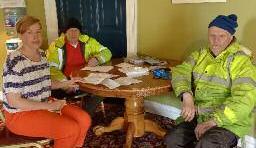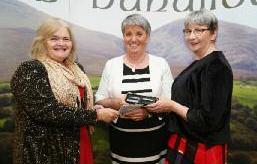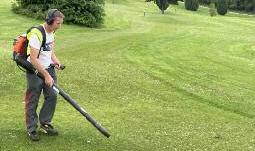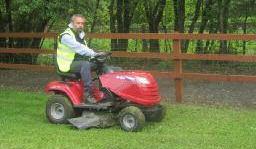
7 minute read
Rural Social Scheme . . . . . . . . . . . . . . . . . . . . . . . . . . . . . . . . . . . . . . . . . . . . . . . . . . . . . . . . . 42
IRD Duhallow Rural Social Scheme
Scheme in 2020 to assess the role and resourcing of Rural Recreation Officers (RRO) in their contribution to the delivery of the Walk Scheme and the development of the outdoor recreation sector generally. IRD Duhallow is currently managing the Walks Scheme without the resource of an RRO. Currently there is one RRO covering the entire County of Cork. A dedicated RRO is necessary to explore and harness the full potential of the natural resources and associated culture and heritage which is unique to Duhallow.
COVID-19 Response
Donal Moynihan providing caretaking duties in Aubane ensuring that once restrictions are lifted, the centre will be ready to welcome everyone back. IRD Duhallow was designated an essential service and joined a multiagency response to contribute to the community-wide efforts to limit the spread of COVID-19. This ensured a coordinated response in the delivery of much needed services to vulnerable citizens across the Counties Cork and Kerry. With the support of RSS participants and their supervisors, IRD Duhallow ’ s essential services in the community were not only maintained but expanded to meet the new demand in our region. RSS participants all rose to the challenge of supporting the efforts of the increased demands placed on Duhallow Community Food Services, Duhallow Warmer Homes Scheme, Duhallow Care and Repair, Duhallow REVAMP and Duhallow Community
Laundry. The services and support mechanisms including door to door collections and deliveries helped people to remain well at home while cocooning. A rota system of teams including RSS participants was put in place to ensure continuity of service.
Community Care
The Community Care Committee aim to support older and more vulnerable Don Horgan grass cutting in Banteer GAA which adults to maintain successful he along with other participants throughout independent living reduce the Duhallow maintained during ensuring once restrictions were the pandemic lifted the clubs level of admissions to were ready to open to their members. hospital/residential care and increase the social reconnection of these people in their own communities. If patients are discharged to unsafe, cold, unsuitable homes,

Nora Shine keeping on top of all the weeds in Rockchapel. they are more likely to return to hospital. By request of the local Public Health Nurses, housing assessments have been conducted by the RSS Supervisors. In some instances, the homes fail to meet basic standards of warmth and safety and therefore clean ups and alterations need to be made. Following the sensitive assessment of a home, recommendations are sent to the HSE and
Community Welfare Officer. Work usually involves general clean up, painting and necessary adaptations or repairs. Referrals to the Warmer Homes Scheme have been made and the Furniture REVAMP project has been able to assist in providing furniture and other household items.
Participants fencing the Pond Field in Banteer, which was a popular walk during COVID restrictions.
Niall Burke getting his delivery ready for Duhallow Furniture Revamp.
Retirements
During the past year we said a fond farewell to a number of participants who finished their time on the RSS including: Tim Enright, Gerald Duggan, Paddy Lucey, Eileen Moynihan, Dermot Murphy, Joan Murphy and Liz Walsh, all of whom worked exceptionally hard in their respective placements. We also said goodbye to Supervisor Sheila O’Keeffe who reached retirement age last year after sixteen years of service.

Before Sheila O’Keeffe retired her years of service were acknowledged by Board members Anne Maria Bourke and Mary Wallace.
In Remembrance - Morty Cashman RIP
RSS participant Morty Cashman sadly passed away in January 2021. Morty joined the RSS in 2019 and was a great worker partaking in a variety of community projects during that time. He is greatly missed by his colleagues in IRD Duhallow. Ar dheis Dé go raibh a anam.
Tús Community Activation

Tús is a community work placement initiative providing short-term working opportunities for people who are long-term unemployed. Tús is managed locally by IRD Duhallow on behalf of the Department of Social Protection, which has overall responsibility for the scheme. IRD Duhallow has an allocation of 60 places where participants work for 19.5 hours a week for 12 months in a variety of community based placements. Participants are randomly selected from the Live Register and offered the opportunity to participate on the scheme. If a Jobseeker who is selected to participate on Tús fails to co-operate or fails to take up the offer, they will be referred for further action and investigation. It is possible to seek a placement on Tús as a self-referral by contacting the local Social Welfare branch if the person has been on the Live Register for 12 months or more and hasn ’t participated on the scheme in the past 3 years. To be eligible to participate on Tús a person must be: • fully unemployed and in receipt of a jobseekers payment continuously for at least 12 months (A break of up to 30 days in the past 12 months may be permitted) and • must be currently in receipt of a Jobseeker ’ s Allowance payment, or • must be in receipt of Jobseeker ’ s Transitional Payment, or • refugees aged 18 years old, authenticated by the Department of
Justice & Law Reform (Garda Registrar Certificate with Stamp 4) and getting Jobseeker ’ s Allowance payment (no qualifying period applies). The rates of payment on Tús is linked to a person ' s existing Jobseeker ’ s Allowance with a minimum payment of €225.50 or €134.70 for a Qualified Adult. Other payments in respect of qualifying children is €38 for a child under 12 years and €45 for a child over 12. Participants are entitled to statutory annual leave during the 52 week period. All Tús payments are made by Electronic Fund Transfer into bank accounts. Participants can keep any secondary benefits they had before they took up the Tús placement scheme, subject to income levels e.g. rent allowance, medical card, fuel allowance etc. They receive the same statutory (pro rata) annual leave and public holiday entitlement as other employees.
The expected benefits of joining Tús are numerous including social benefits concerning an individual' s success in effectively and Amarachi Ogbuji working in the constructively participating in social, civic and working life. Tús helps
Temperance Hall, Kanturk people to grow in confidence in their own employability, acquire new skills and in most cases people engage more effectively with the labour market upon their exit from the scheme. The placement provides an immersive experience for the participant to gain a greater understanding of the workplace and prepares them for the open labour market. IRD Duhallow has developed strong linkages with local employers through the Job Centre and programmes such as Skillnet, LEADER and the Social Inclusion Community Activation Programme.
Integrated Supports
IRD Duhallow ’ s Tús scheme aims to promote an all-inclusive activation programme which incorporates the provision of job-search assistance and training options, not designed solely to address labour market issues of those on the scheme, per se but, also informed by actions to improve the quality of life of the participants and their families where possible. A wraparound approach underpins the scheme as participation on Tús often acts as a gateway for participants and their families by improving
Supervisor Nuala Riordan with Tús participant John Sheehan maintaining the Banteer Community Park.
Testimonial - Sean Donovan
“After a few years of being unemployed I joined IRD Duhallow, as a Tús participant doing administrative work. I enjoyed it as it allowed me to get back into the swing of working again and I was able to put the computer skills I learned in college to use in a work environment. Thanks to the many courses that IRD Duhallow run, I was able to find full time employment within 5 months from starting on Tús. I would recommend the scheme, as it is easy to transition from the scheme to full time employment, due to the training and the experience of being in a work environment again” .

Mohammed Hoque does the village renewal in Kiskeam.



